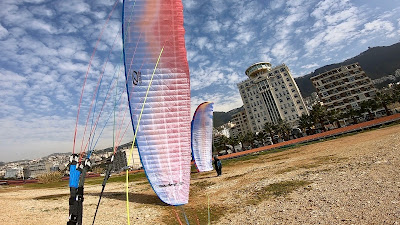ADVANCE Lightness 3 M
I already flew the Lightness2 in M size. My size is 1.81 and my weight is 73 kg.
Both the Lightness 2 and 3 suit my size perfectly. The Lightness 3 offers a superb back comfort, as much as the Lightness 2 did.
It’s a very comfortable harness for supporting the back and the legs are naturally supported. The Lightness 3 is indeed one of the most comfortable seatless harnesses for back and hip comfort.
The finishing details of this harness is second to none.
I have other ADVANCE harnesses, the Progress 3, success 4, easiness 2 and the Bi pro. They all share that exceptional finish ! As if they were all made in a very independent (Apple factory) ;-)
The very good quality finish is very clear to one’s eye.
I also sensed that for my shape, the harness has a snug fit and feels also quite robust if you look at the attachment points versus a GTO Light for example. The straps looks slightly wider and feels quite close to a normal harness in that matter.
The Lightness3 has a left channel for a relief tube. A camel back pocket on the rear. The pocket under the seat would fit a 5 L ballast. The back compartment is a bit small. I found out that only a glider bag can fit inside.
All the strap adjustment can be reached very easily and swiftly modified while flying, unlike the GTO light or the Forza for example.
The speed system has a two step design with small stepping insert acting like pedals…Now goes my explanations in english :-)
The rescue compartment feels a bit small also. I think for the M size, a light (±1kg) rescue for 100 KG max would fit perfectly. I tried to open the rescue 2 times while hanging the harness in my room, and when pulling the handle horizontally (sideways) it needs a slight pressure, more than the GTO light one. The rescue compartment doesn’t seem very big. But in both cases, the rescue was out immediately with a snap feel.
Comparison with the Lightness 2 in the air:
I flew the Lightness 3 with a Q-light S size at max weight. I also flew a Supair Delight 3 M with a seat board on the same glider. The most comfortable one in turbulent air was the Delight3 and followed very closely by the Lightness 3, and +50 % more feedback was delivered by the Lightness 2.
when it comes to being thrown around in turbulent air, the difference between the Lightness 2 and 3 are very clear.
When the chest strap of the Lightness 3 is a bit more open, then the information about the air is superb! The Lightness 3 delivers just the necessary amount of feedback, without any useless movements that were found earlier on the Impress 3.
I also found an interesting efficient option on Lightness 3 regarding the chest strap. In turbulent and strong air, when closing the chest strap, the Lightness 3 locks you in a firm position and becomes a roll stable seatless harness. Of course, all harnesses will be more stable when chest straps are closed, but the difference between open and closed is sometimes huge in one specific harness.
The stability was felt more than any seatless harness I have tested! So the Lightness 3 has a sensible chest strap adjustment efficiency for a wide choice and pilot taste.
In the air while the pod was already closed, a little wind was entering between the layers, that could probably need more tuning (later)
Now for the picky pilots (like me ) and performance-oriented ones, I could say that the Delight 3 (seat harness) with a (chest open) can deliver quite a precise input for placing gliders with any pressure on any muscle of your lower body! That option of putting yourself on a seat board and sensing every bit of air and efficiently reacting is only available on a seat board. For instance, The GTO light, Forza, Lightness2, Lightness3 can deliver the best back comfort versus a seat harness, and glider feedback, but will never let you react as fast and efficient as a seat board will, IMHO.
Conclusion: Seat or no seat, is a matter of taste. The seatless harnesses like the Lightness3 offers exceptional back comfort for long flights, light with superb quality equipment!
The seat harness delivers imminent body reaction, precise feedback and control you can induce to a high aspect ratio glider.
For my personal feel, the Lightness 3 is indeed a superb piece of equipment which also holds all the required options for the pilots of today.
Construction quality at its best, very high degree of back comfort, comfortable enough in turbulence, light to carry after long XC’s, and I think it looks quite robust for a light harness.
This is only my opinion. Make your own !










